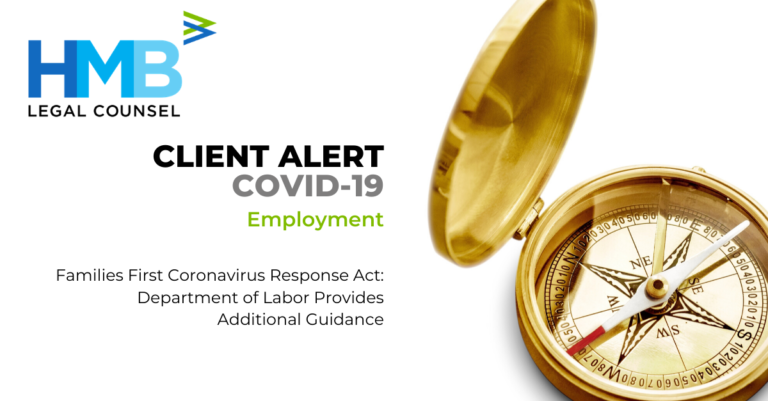The Families First Coronavirus Response Act (the “FCCRA”) was signed into law on March 18, 2020. Since then, questions as to scope and applicability have been raised by employers and employees alike. The U.S. Department of Labor has and continues to provide guidance as to how employers and employees should interrupt the FFCRA. A summary of the FCCRA can be found here.
Highlights from the most recent round of guidance include:
Who is Eligible for Paid Sick Leave or Expanded Family Leave under the FCCRA?
The FCCRA only covers those employees who are actually working for their employers, including those employees working remotely. Employees who are furloughed and still providing services are eligible for paid sick leave and expanded family and medical leave under the FCCRA (collectively, “Leave”) for a qualifying reason. However, employees who have been terminated or furloughed and are not providing any services are not eligible for Leave under the FCCRA.
Does an Employee have to take all of their Leave at Once?
It depends. If an employee who works remotely has a qualifying reason, and the employer approves, the employee may take Leave on an intermittent basis. Employees who are working at their usual worksite will only be able to take Leave on an intermittent basis to the extent the employee is taking such leave because they are caring for a child whose school has been closed or such child’s child care provider is unavailable. If the employee is taking leave because they are sick, caring for someone who is sick, or subject to a quarantine order, the employee must remain on leave until the qualifying reason for taking leave no longer exists. These restrictions are being imposed to help prevent the further spread of the coronavirus to others.
Additional Leave Benefits
Employers may provide payments in excess of the caps set forth in the FCCRA. However, employers will not receive a tax credit for such excess payments. Employees also retain other employer benefits to which they are entitled (e.g., vacation days, sick days, comp days, etc.). However, employees may not take Leave under the FCCRA and leave under such other benefits programs unless the employer agrees to let employees supplement their FCCRA benefits with other employer provided benefits.
What Happens if the Employer Shuts Down?
If an employer shuts down, the employer’s obligation to provide Leave terminates, including if there are employees already on Leave. An employer is only required to pay the employee for any Leave actually taken prior to the closure.
Employer and Employee Recordkeeping Obligations
An employee is required to provide documentation to their employer sufficient to support the employee’s need to take Leave (e.g., copies of quarantine orders and school closure notices). An employer is required to provide such supporting documentation to the Internal Revenue Service (the “IRS”) to the extent such employer plans to claim a tax credit under the FCCRA. Existing certification requirements under the Family Medical Leave Act have not changed.
Exemptions for Small Businesses
Businesses with fewer than 50 employees do not have to provide Leave if (i) such leave is being requested because an employee’s child’s school is closed or the child’s child care provider is unavailable, and (ii) an authorized officer of the business has determined that (a) providing Leave would cause business expenses to exceed available revenue, resulting in the business being unable to operate at minimum capacity, (b) the absence of employees requesting Leave would substantially risk the financial health or operational capabilities of the business because of such employee’s specialized skills, knowledge of the business, or responsibilities, or (c) there is an insufficient number of employees who are willing and able to work and such labor is needed for the business to operate at minimum capacity. Employees would still be eligible for Leave to the extent they are sick, caring for someone who is sick, or is otherwise subject to a quarantine or isolation order.
Refunds
As previously noted, an employer that provides Leave is eligible for payroll tax credits (self-employed individuals are eligible to receive similar credits). If an employer provides Leave to its employees, the employer can hold-back the payments it would otherwise be required to make to the IRS in an amount equal to what the employer paid to its employees who are on Leave. To the extent the amount of the credit exceeds the amount of payroll taxes owed by the employer in a particular quarter, the excess shall be treated as an overpayment and be refunded to the employer. The IRS intends to issue any refunds owed as quickly as possible.
HMB Legal Counsel will continue to provide updates as the situation evolves. The ongoing issues related to the spread of the Coronavirus (COVID-19) have had and will continue to have a significant impact on individuals, families, businesses and markets. Visit our collection of resources providing guidance during these fast-changing circumstances. Please reach out to your HMB team member to answer specific questions.



